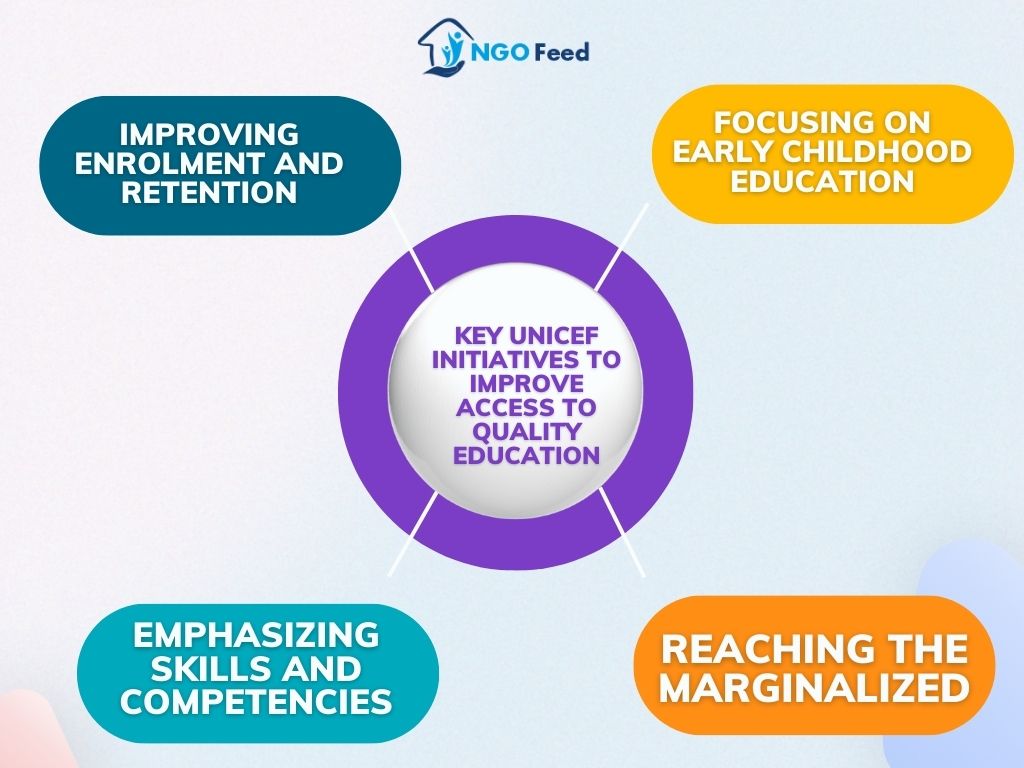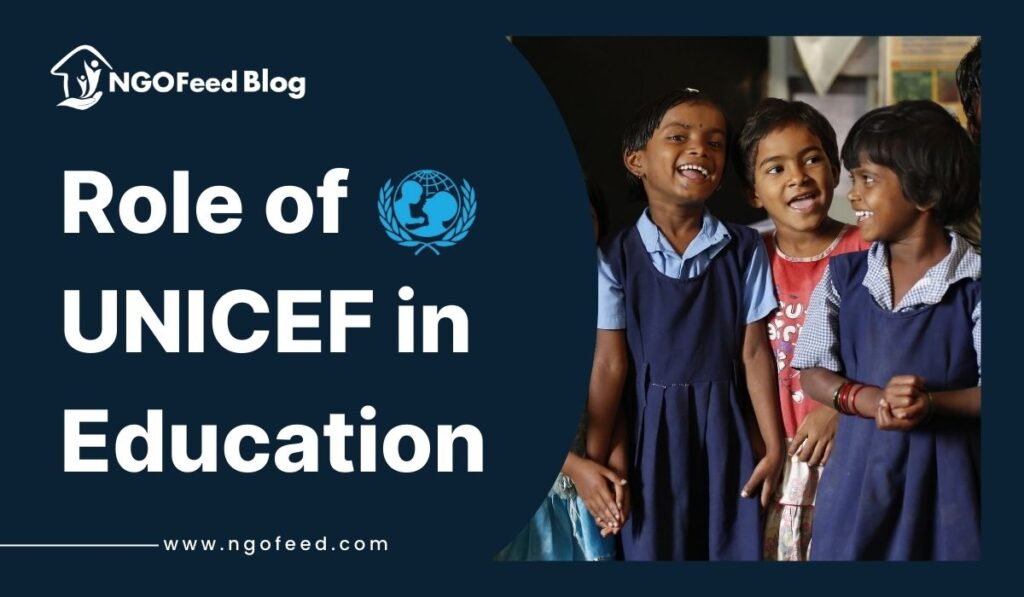Role of UNICEF in Education: You’ve probably heard how important education is. However, did you realise that millions of Indian youngsters still do not have access to a high-quality education? Attending a quality education is still out of reach for many people. UNICEF steps in at this point. They collaborate closely with the Indian government to promote universal education. Their objective? is to guarantee that all children, whatever their circumstances, may reap the advantages of education. They try to raise enrollment rates and the quality of school instruction via several programs. Truly inclusive education, however, requires overcoming several obstacles. Discover UNICEF’s work to provide every child in India with the pleasure of learning. Education provides access to more promising futures. And UNICEF works to bring this to pass.
UNICEF’s Mission for Gender Equality in Education in India
In UNICEF’s opinion, education is essential for empowering girls and advancing gender equality. UNICEF strives to improve school enrollment and retention rates for girls in India. Through outreach programmes, UNICEF educates parents and community leaders on the value of girls’ education. UNICEF also offers scholarships and stipends to encourage families to send their daughters to school.
In addition, UNICEF wants to make schools more “girl-friendly” by enhancing hygienic conditions, hiring female instructors as role models, and imparting helpful life skills to young women. These actions make educational settings more friendly and safe for females. UNICEF allows females to remain in school, develop critical thinking skills, and seek jobs.
UNICEF also pushes for legislative modifications to encourage girls’ education in India. They collaborate with government representatives to carry out initiatives such as allocating seats in schools for females alone, giving free school lunches and uniforms, and giving girls access to vocational training. In addition, UNICEF urges policymakers to strengthen financing for girls’ education and uphold the prohibitions on child labour and child marriage.
UNICEF hopes to empower women and girls in India and attain gender parity in education via these initiatives. UNICEF helps girls reach their full potential and become leaders and role models in their communities by providing them with equitable educational opportunities. Regardless of gender, universal education is essential for growth. With UNICEF’s efforts to promote girls’ education, India is getting closer to realising this dream.
Key UNICEF Initiatives to Improve Access to Quality Education

Improving Enrolment and Retention
You must enter a classroom to get an education. UNICEF collaborates with the Indian government to increase school enrollment, particularly for females and underprivileged children. To ensure that education is available to everyone, they construct additional schools, hire more instructors, and provide supplies like books and uniforms.
Focusing on Early Childhood Education
Given the importance of the early years for development, UNICEF assists in establishing preschools and kindergartens across India. They contend that excellent early learning experiences prepare kids for success in elementary school and beyond.
Emphasizing Skills and Competencies
Attending school is insufficient on its own. UNICEF programmes aim to assist children in acquiring vital life skills. They support life skills education, activity-based learning, and teacher training on kid-friendly techniques. The aim is for kids to acquire skills and information that will help them for a long time.
Reaching the Marginalized
Education presents enormous challenges for students because of their poverty, gender, ethnicity, or handicap. UNICEF creates focused initiatives to support these underprivileged populations. For instance, they manage schools reserved for the children of migrants and provide instructors with sensitivity training for the requirements of children with impairments. To leave no kid behind is the goal.
UNICEF strives to ensure that every child in India has access to a high-quality education via a multifaceted strategy focusing on early learning, inclusion, skills, and accessibility. Even though there is still much to be done, programmes like these are assisting in shaping a more promising future for the country. Opportunity is unlocked by education, and UNICEF works to ensure that everyone can take advantage of this.
Collaboration With Government for Equity in Education
Improving Access
UNICEF and the Indian government collaborate closely to increase children’s access to education nationwide. UNICEF works to reach children in even the most distant locations by assisting in constructing new schools, providing educational resources, and training additional instructors. The intention is for every kid, irrespective of gender, caste, religion, or place of residence, to have access to a high-quality education.
Focusing on Girls and Marginalized Groups
In India, there are more than 50 million females, yet many of them encounter obstacles to education because of lack of access, poverty, and societal conventions. To advance gender equality and inclusion, UNICEF programmes mainly target underprivileged and vulnerable populations. This covers providing scholarships, teaching life skills, and updating school infrastructure like having separate restrooms for females. UNICEF also strives to keep girls in school and put an end to child marriage.
Improving Quality
Enrolling children in school is not sufficient on its own. With the government, UNICEF works to improve education standards by implementing kid-friendly teaching strategies, updating the curriculum, and improving teacher preparation. The goal is to provide engaging learning settings where kids may acquire the skills and information they need to thrive in life. Programmes also support education for young children, as 90% of brain development happens before age.
UNICEF and the Indian government have partnered for many years, and together, they have accomplished a great deal in providing education for all children. With the most prominent young population in the world, however, more has to be done to ensure every kid has access to a top-notch education and a promising future. Through sustained enhancement of accessibility, equality, and quality, UNICEF and India can unleash the immense potential of the next generation.
The Impact of Online Learning on Education for All
The emergence of online learning has revolutionised the way individuals worldwide may get an education. The potential of online and remote learning is revolutionary for UNICEF’s Education for All project.
Increased Access
Online courses make education accessible to those who may not otherwise have the means or ability to attend traditional schools. Whether due to location, disability, or other barriers, online learning opens education to many more people. UNICEF supports government programs that provide technology and infrastructure for students to take advantage of distance education opportunities.
Self-Paced Learning
Most online courses are self-paced, making them perfect for those who must balance their education with obligations to their families or jobs. Pupils can work at their own speed and log in whenever their schedule permits. The ability to tailor and adjust the learning process has a particularly significant effect on older students or those more likely to drop out due to personal circumstances.
Lower Costs
Online learning is often less expensive than conventional education. Eliminating the need for actual classrooms and campuses results in significant cost savings, which may be transferred to students through cheaper course materials and reduced or nonexistent tuition. Investing in online learning infrastructure and technology is a cost-effective strategy for UNICEF and the governments they collaborate with to maximise the number of students reached.
Online education is valuable for increasing access to and equity in education, even while it cannot replace in-person instruction. UNICEF and its partners are advancing the objective of universal education by funding initiatives that use technology and remote learning. The cost and flexibility of online courses have the power to revolutionise education, both in India and outside.
Education for All: FAQs on UNICEF’s Efforts in India
What is UNICEF doing to promote education in India?
The Indian government and UNICEF collaborate closely to guarantee every child access to high-quality education. Enhancing accessibility to schools, supplying educators with training, and pushing for legislative reforms are some of their main projects. UNICEF, for instance, funds initiatives that provide pupils with bicycles for commuting to school and meals to promote attendance. To encourage females to continue their education, they also try to create gender-neutral learning spaces.
How does UNICEF help marginalized children get an education?
UNICEF seeks to assist children who are disadvantaged in their education because of their social class, gender, poverty, or disability. They collaborate with state governments to provide underprivileged students with transport, housing, and scholarships. Additionally, UNICEF collaborates with non-governmental organisations to manage programmes that enable children who are migrant, child labourers, or disabled to get an education. UNICEF also promotes legislative reforms, such as allocating places in schools to underprivileged kids.
What challenges remain in achieving education for all in India?
Even though access to education has improved in India, many kids still don’t attend school. Some children are still unable to attend due to societal restrictions, child labour, and poverty. Basic amenities and trained instructors are sometimes lacking in rural and isolated places. Children with impairments typically cannot attend schools, and girls also experience prejudice and a lack of protection. Laws require schooling and forbid child labour, but enforcement is still problematic. These enduring issues must be resolved to provide all children in India with an equal and high-quality education.
Millions of Indian children now have access to school thanks to UNICEF’s efforts, but more needs to be done. Through collaborating with local communities and pushing for legislative reforms, UNICEF seeks to remove obstacles to every child’s access to education, regardless of their circumstances. The young of India must have access to education to escape the cycle of poverty and create better futures for themselves.
Conclusion
You possess the ability to change things. Encourage support for UNICEF and other organisations that provide all children, particularly those in underdeveloped nations like India, access to education. Every kid should have the opportunity to develop, learn, and create a better future. One of the most effective strategies we have to end the poverty cycle is education. A fresh narrative of hope is written every time you give, support, or work as a volunteer for organisations that assist children in attending school.


Thank you for your help